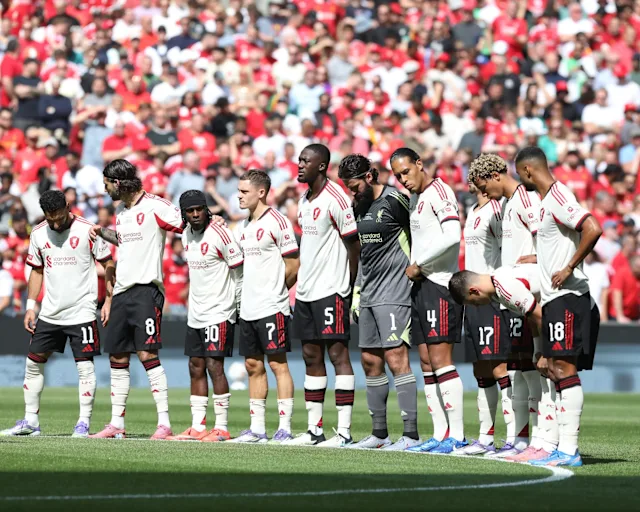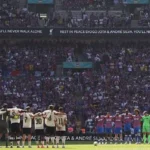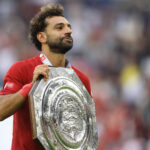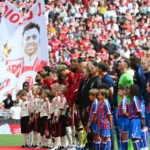A Moment of Tragedy and Respect The Diogo Jota Tribute at Wembley Stadium

The sun shone brightly over Wembley Stadium on what should have been a celebration of English football’s traditional curtain-raiser. The Community Shield, that annual fixture that bridges the gap between seasons and offers the first silverware opportunity of the new campaign, was set to showcase two of the Premier League’s most exciting teams. Liverpool, fresh from their title triumph, would face Crystal Palace in what promised to be an entertaining encounter. Yet beneath the surface of sporting competition lay a profound sadness that would cast a shadow over the entire proceedings.
The hallowed turf of Wembley has witnessed countless moments of triumph, despair, and raw human emotion throughout its storied history. However, few occasions have carried the weight of genuine tragedy quite like the pre-match tribute that preceded this Community Shield clash. What should have been a moment of unified respect and remembrance for a beloved footballer instead became a stark reminder of how quickly sporting celebrations can be overshadowed by real-world grief and the complexities of human behavior in moments of collective mourning.
Liverpool captain Virgil van Dijk, a man who has worn the armband with distinction through numerous high-pressure situations, found himself confronting a different kind of leadership challenge as he watched a tribute to his fallen teammate cut short by the very people who should have been showing respect. The disappointment etched across his face spoke volumes about the profound impact of losing not just a colleague, but a friend whose life was tragically cut short at the peak of his career.
The events that led to this somber moment at Wembley began on a summer morning in Spain that will forever be etched in the memories of Liverpool supporters and football fans worldwide. Diogo Jota, the Portuguese forward who had become such an integral part of Liverpool’s attacking arsenal, was traveling through the Spanish countryside when tragedy struck in the most cruel and sudden manner possible. The 28-year-old, accompanied by his younger brother André Silva, was involved in a catastrophic car accident near the province of Zamora that claimed both their lives instantly.
The details of the crash paint a picture of how quickly life can change from routine to tragedy. The brothers were traveling back to England ahead of Liverpool’s pre-season training when their vehicle veered off the road in circumstances that investigators are still working to fully understand. The loss was not just of a talented footballer, but of a devoted family man who had recently married his longtime partner Rute Cardoso in a beautiful ceremony in his home city of Porto on June 22, just eleven days before the accident. Jota left behind three young children who would now grow up without their father’s guidance and love.
For Liverpool Football Club, the loss represented more than just the death of a key player. Jota had embodied many of the qualities that defined the club’s recent success under Jürgen Klopp and now Arne Slot. His work ethic, technical ability, and genuine warmth had made him a favorite not just among supporters but throughout the squad. The Portuguese international had scored crucial goals in big matches, celebrated with characteristic humility, and conducted himself with the kind of professionalism that marked him as a role model for younger players.
The timing of the tragedy made it all the more poignant. Jota had just completed what many considered his best season in a Liverpool shirt, playing a crucial role in the club’s Premier League title triumph. His 26 league appearances, yielding six goals and four assists, told only part of the story of a player who had matured into one of the most reliable and intelligent forwards in European football. The prospect of watching him develop further and potentially captain the team in future years made his loss even more profound for those who knew him well.
To understand the magnitude of Liverpool’s loss, one must look beyond the impressive statistics that Jota accumulated during his time at Anfield. While his goal-scoring record and assist numbers told one story of his contribution, the deeper impact lay in his ability to lift the entire team’s performance through his movement, intelligence, and tactical awareness. Jota possessed that rare quality of making those around him better players, creating space for teammates and linking play in ways that often went unnoticed by casual observers but were deeply appreciated by coaches and fellow professionals.
His journey to Liverpool had been far from straightforward. After developing through the youth systems in Portugal and spending time at various clubs including a transformative period at Wolverhampton Wanderers, Jota had found his true home at Anfield. The transition from the demanding but different style of play at Wolves to Liverpool’s high-intensity pressing game had showcased his adaptability and football intelligence. Under Klopp’s guidance, and later Slot’s, he had evolved from a talented winger into a versatile forward capable of operating across the front line with equal effectiveness.
The Portuguese’s technical ability was matched by his physical attributes and mental strength. Standing at 5’10”, he combined pace with power, skill with directness, and creativity with clinical finishing. His left foot was perhaps his most potent weapon, capable of producing moments of magic that could change the course of matches. But it was his football intelligence that set him apart – his ability to read the game, make the right runs, and be in the right place at the crucial moment.
Beyond his on-field contributions, Jota had become a beloved figure in the Liverpool dressing room. Teammates consistently spoke of his positive influence, his willingness to help younger players, and his ability to maintain high spirits even during difficult periods. His journey from Wolves to Liverpool had been marked by continuous improvement and adaptation, suggesting a player who was still nowhere near his peak when tragedy struck
The decision to honor Jota and his brother during the Community Shield was both natural and complex. As Liverpool’s first competitive fixture since the tragedy, the match represented an opportunity for the football community to come together in remembrance. However, organizing a fitting tribute that would satisfy the emotional needs of grieving supporters while respecting the solemnity of the occasion required careful planning and coordination between multiple organizations.
The Football Association, working closely with both Liverpool and Crystal Palace, had spent considerable time crafting a tribute that would honor both brothers appropriately. The plan was comprehensive and thoughtful: a minute’s silence to be observed by all 90,000 people expected to attend, the laying of wreaths on the pitch by club representatives, and various other symbolic gestures designed to create a moment of reflection and respect. Liverpool legend Ian Rush and Crystal Palace chairman Steve Parish were chosen to perform the wreath-laying ceremony, representing the unity of football in the face of tragedy.
Liverpool had also incorporated subtle tributes into their kit design for the match, ensuring that Jota’s memory would be carried onto the pitch in a visible but tasteful manner. The players would wear black armbands, and a special commemorative program was produced featuring tributes from teammates, opponents, and football figures who had been touched by Jota’s life and career.
The logistical challenges of organizing such a tribute at Wembley were considerable. With over 80,000 people expected to attend the match, ensuring that the message about the tribute reached all sections of the stadium required extensive communication efforts. Public address announcements, electronic scoreboard messages, pre-match media coverage, and social media campaigns all emphasized the importance of respecting the moment of silence and participating in the collective act of remembrance.
Stadium officials worked closely with both sets of supporters’ clubs to ensure that the message about appropriate behavior during the tribute was clearly communicated. Fan liaison officers from both clubs had been briefing supporters about the significance of the moment and the expectation that all attendees would participate respectfully in honoring Jota and his brother’s memory.
As kick-off approached and the anticipation in the stadium reached its peak, the atmosphere began to shift toward the solemnity required for the tribute. The public address system crackled to life, and the announcer’s voice carried across the vast expanse of Wembley, explaining the purpose of the tribute and requesting that all 80,000 people present observe a minute’s silence in honor of Diogo Jota and André Silva.
The players from both teams, accompanied by match officials, lined up in the center circle. The sight was moving – professional athletes who spend their careers competing against each other, united in a moment of shared humanity and respect for a fallen colleague. Liverpool players, many of whom had played alongside Jota for years, stood with their heads bowed, their faces reflecting the genuine grief they felt for their lost teammate.
As the stadium fell quiet and the minute began, there was initially the profound silence that such moments demand. The only sounds were the distant hum of traffic beyond the stadium and the occasional flutter of flags in the gentle breeze. For many in attendance, it was a moment of genuine reflection on Jota’s life, his contributions to football, and the fragility of life itself.
Then, cutting through the silence like a knife, came voices from the Crystal Palace end of the stadium. What started as isolated shouts quickly became audible enough to disrupt the intended atmosphere of remembrance. The words “Eagles” could be heard being chanted, a reference to Crystal Palace’s nickname, completely inappropriate for the solemn moment being observed. The disruption grew rather than diminished, with more voices joining in what appeared to be a deliberate attempt to undermine the tribute.
The reaction from other parts of the stadium was immediate and telling. Liverpool supporters, already emotional from the loss of a beloved player, responded with visible anger and frustration at the disrespect being shown. The sound of boos began to emanate from the Liverpool sections, creating a cacophony that further disrupted the intended silence. More significantly, the majority of Crystal Palace supporters who were participating respectfully in the tribute turned on their own fans, attempting to silence those who were disrupting the moment and expressing their own disgust at the behavior of their fellow supporters
For the match officials, the deteriorating situation presented a challenging dilemma. The minute’s silence was intended to last the full sixty seconds, but with the disruption becoming more pronounced rather than settling down, a decision had to be made about whether to continue or cut the tribute short. The referee, in consultation with other officials and stadium security, made the pragmatic but painful decision to end the silence prematurely by blowing his whistle.
This decision, while necessary for maintaining order and preventing further escalation, meant that the intended full minute of reflection was lost. The whistle that ended the tribute was met with applause from the majority of supporters who had been observing the silence respectfully, but it also represented a failure of the football community to properly honor one of its own in his moment of remembrance.
The referee’s choice to cut short the tribute was not taken lightly. Officials later explained that they felt the disruption had become so significant that continuing would have only led to further deterioration of the atmosphere and potentially more serious crowd problems. The safety and dignity of the occasion had to take precedence, even if it meant sacrificing the full tribute that had been planned
For Virgil van Dijk, watching the tribute unfold and then deteriorate represented a profound test of his leadership capabilities. As captain, he bore responsibility not just for his team’s performance on the pitch but for representing Liverpool’s values and dignity in moments of crisis. The visible disappointment on his face as the silence was cut short spoke to both his personal grief over Jota’s death and his frustration at the failure to properly honor his former teammate.
Van Dijk’s relationship with Jota had been particularly close, extending beyond their professional partnership to genuine friendship. The Dutch defender had often spoken about Jota’s positive influence in the dressing room and his ability to lift the spirits of teammates during difficult periods. As senior players, they had formed part of the leadership group that helped maintain Liverpool’s standards and culture during transition periods.
The captain’s immediate response to the disrupted tribute was measured and dignified. Rather than allowing his frustration to boil over into public criticism or confrontation, van Dijk maintained his composure and focused on supporting his teammates who were equally affected by the failure to properly honor their friend. His leadership in this moment was perhaps more important than any he had shown on the pitch – demonstrating that true captaincy extends far beyond tactical decisions and motivational speeches.
In the aftermath of the incident, van Dijk would later express his disappointment in measured terms, acknowledging the majority of supporters who had tried to observe the tribute respectfully while noting the sadness he felt that a minority had prevented the full moment of remembrance from taking place. His words reflected the pain of someone who had not only lost a friend but had seen that friend’s memory disrespected in a very public forum.
Crystal Palace Football Club found itself in an extraordinarily difficult position following the disruption. The club’s hierarchy, including chairman Steve Parish, were devastated that supporters bearing their club’s colors had been responsible for disrupting such an important moment. Parish, who had participated in the wreath-laying ceremony as part of the tribute, was particularly affected by the contrast between the club’s official recognition of Jota’s passing and the behavior of some supporters.
The club’s immediate response emphasized that the disruptive behavior did not represent the values or wishes of the vast majority of Crystal Palace fans. In a strongly-worded statement, the club condemned the actions of those responsible and promised a thorough investigation to identify and take appropriate action against any supporters found to have behaved inappropriately. The statement also highlighted the positive actions of the many Palace fans who had attempted to silence the troublemakers and who had participated respectfully in the tribute.
Crystal Palace’s response went beyond mere words. The club launched an immediate investigation, reviewing security footage and working with police to identify those responsible for the disruption. They also announced that any supporters found to have been involved in disrupting the tribute would face banning orders and would not be welcome at future matches. This swift and decisive action was crucial for maintaining the club’s reputation and demonstrating that such behavior would not be tolerated.
The incident also prompted Palace to review their own procedures for communicating with supporters about appropriate behavior during special occasions. The club recognized that while they could not control every individual’s actions, they had a responsibility to clearly communicate expectations and ensure that supporters understood the significance of moments like the Jota tribute
While the disruption dominated headlines and discussion, it is important to acknowledge that the vast majority of the 80,000 people present at Wembley that day conducted themselves with appropriate dignity and respect. The majority of Crystal Palace supporters were as appalled by the minority’s behavior as anyone else in the stadium, and many actively tried to stop the disruption by shouting down those responsible and expressing their own disapproval.
Liverpool supporters, despite their grief and anger at the disrespect shown to their former player, largely maintained their composure and participated in the tribute as intended. Their emotional response to the disruption was entirely understandable, but they did not allow their frustration to escalate into the kind of behavior that could have made the situation worse.
The positive response from the majority served as a reminder that football, at its best, can bring people together in moments of shared humanity. The fact that so many people from different backgrounds and allegiances could unite in honoring Jota’s memory demonstrates the sport’s capacity to transcend tribal divisions when faced with genuine tragedy.
The media coverage of the disrupted tribute reflected the complex emotions and perspectives surrounding the incident. Sports journalists found themselves balancing the need to report on what had happened with sensitivity toward Jota’s family and Liverpool supporters who were still grieving. The coverage had to navigate the challenge of not giving excessive attention to the disruptive behavior while still acknowledging its impact on the intended tribute.
BBC Sport’s Emma Smith, reporting from Wembley, captured the essence of the incident: “Unfortunately the moment of silence for Diogo Jota and Andre Silva was interrupted by a few people shouting from the crowd, and was cut short. The majority of supporters show their appreciation for Jota and Silva with applause after the ref blew his whistle.” Her report emphasized both the disruption and the positive response from the majority.
Sky Sports’ Peter Smith provided additional context, noting that the disruption came from “a few Crystal Palace fans called out ‘Eagles’ during the minute’s silence for Diogo Jota, which drew boos from the Liverpool end.” This reporting helped establish that the problem was caused by a small minority rather than a widespread failure of respect.
Public reaction was swift and largely condemnatory of those who had disrupted the silence. Social media platforms saw an outpouring of support for Jota’s memory and criticism of the antisocial behavior, with many users expressing disappointment that a minority had spoiled what should have been a unifying moment of respect. The incident became a talking point far beyond football circles, with commentators from various fields weighing in on issues of public behavior and social responsibility.
Liverpool manager Arne Slot, in his first major test as the club’s new manager, handled the situation with the kind of measured wisdom that suggested he understood the broader implications of his response. Rather than inflaming tensions with harsh criticism of Crystal Palace or their supporters, Slot chose to give those responsible “the benefit of the doubt” while acknowledging the disappointment felt by his players and the club’s supporters.
Slot’s response demonstrated the kind of leadership that Liverpool had hoped for when they appointed him as Jürgen Klopp’s successor. His ability to maintain perspective in an emotionally charged situation, while still acknowledging the legitimate pain felt by his players and supporters, showed a manager capable of navigating complex situations with dignity and intelligence.
The new manager also used the incident as an opportunity to speak about Jota’s character and the impact his loss had on the squad. Slot, who had never worked directly with Jota but had inherited players who had been deeply affected by his death, spoke eloquently about the responsibility he felt to honor his predecessor’s memory through the team’s performances on the pitch.
The Jota tribute incident provided valuable lessons for how football authorities, clubs, and supporters might better handle similar situations in the future. The importance of clear communication about expectations, the need for adequate security presence during emotional moments, and the value of having contingency plans for dealing with disruptions all emerged as key considerations for future tribute planning.
The incident highlighted the challenges of organizing respectful tributes in environments where tribal loyalties and competitive emotions run high. While the Community Shield provided an ideal platform for honoring Jota given Liverpool’s participation, the competitive nature of the fixture and the mixed crowd of supporters created conditions that made disruption more likely than it might have been in a different setting.
Football authorities began examining whether certain types of tributes might be more effective in different contexts. The possibility of holding separate memorial services, organizing tributes during less emotionally charged fixt















